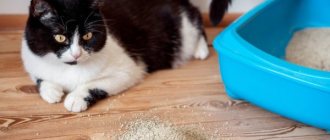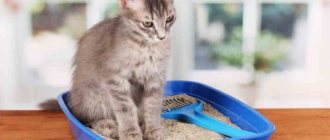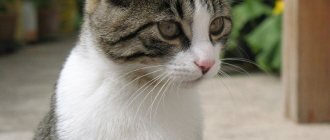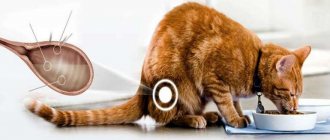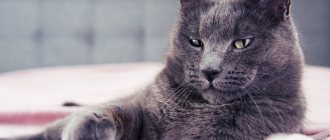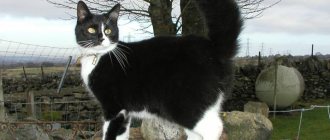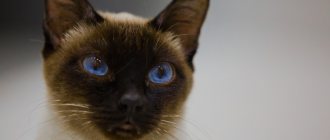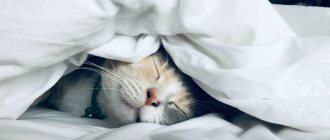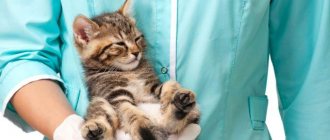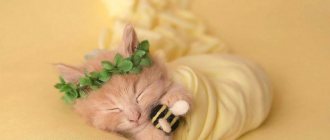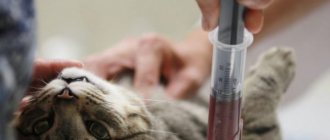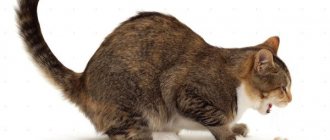Causes of involuntary stool discharge
Most Common Factors
Fecal incontinence in cats is caused by various pathological processes that occur in the body. Initially, we should talk about the insufficient ability of the intestines to retain feces. In addition, when cats have diarrhea, the volume of feces is too large, causing the intestines to be unable to fully absorb and accommodate the feces. Fecal incontinence is often associated with colic in the colon, as well as irritable bowel syndrome. This disease is characterized by chronic pain, discomfort, bloating and bowel dysfunction in the absence of organic causes.
In addition, involuntary discharge of urine and feces can also develop as a result of an infectious lesion of the body. Loose stools are often caused by malignant tumors, injuries and cuts to the anus. Damage to the sphincter can occur during surgery near this area.
An equally common cause of loose stools and fecal incontinence is pathology of the central nervous system. Involuntary excretion of feces can develop against the background of damage to the intervertebral discs and vascular diseases. Often the cause of this condition is various kinds of disorders, as a result of which the nerve endings leading to the anal ring are affected. Failures in the functioning of the autonomic nervous system can also contribute to the problem.
Most fecal incontinence in cats occurs after birth. It can also be caused by the aging of the pet’s body. The older the cat, the more severe atrophy of muscle tissue is observed.
More rare causes
In addition, fecal incontinence in a small cat can be due to the following reasons:
- the presence of fistulas in the perianal area;
- neuromuscular disorders;
- spondylosis;
- intervertebral hernia;
- infection of intervertebral discs.
Return to contents
Causes of the disease
The following reasons contribute to the occurrence of spontaneous bowel movements in cats:
- Decreased tone of the muscle walls of the large intestine.
- Diseases of the digestive system. Fecal incontinence is observed with colitis, irritable bowel syndrome, and the presence of malignant tumors.
- Diarrhea. When large volumes of feces are produced, the rectum loses its holding capacity, causing feces to leak.
- Injuries to the perianal area (scratches, abscesses, bites).
- Complications of surgical interventions. Incontinence occurs if the rectal wall or sphincter is damaged during surgery.
- Infectious diseases. Bacteria penetrate the fiber surrounding the rectum, causing fistulas to form through which feces are released.
- Nervous system disorders. Spontaneous defecation occurs with degenerative myelopathy, spinal cord damage, congenital defects (spinal deformity, spinal cord herniation), intervertebral hernia, trauma, inflammation of the spinal membranes. The innervation of the rectum can be disrupted when the arteries supplying the spinal cord are blocked by fibrous particles.
- Cauda equina syndrome. This term refers to a number of pathologies characterized by narrowing of the sacral part of the spinal canal. The nerve endings coming out of the spinal cord are compressed, which disrupts the functions of the rectum.
- Spondylosis. The disease is characterized by the appearance of bone growths on the vertebral plates.
- Pathological mobility of the lumbosacral spine.
- Bacterial or fungal infections of intervertebral cartilage and bone surfaces of the vertebrae.
- Benign and malignant tumors of the spinal cord.
- Neurological disorders associated with damage to the nerve endings of the perianal area. They occur against the background of infections or taking certain medications (for example, chemotherapy drugs).
- Dysfunction of the autonomic nervous system, neurological diseases of unknown origin.
- Muscular and neuromuscular pathologies.
- Aging of the body. It is accompanied by many pathological changes, for example, a decrease in the tone of the muscles responsible for controlling bowel movements, weakness of the anal sphincter, and impaired innervation.
Associated symptoms
A pet owner can suspect fecal incontinence based on the main sign. Feces come out from a kitten or an older animal during sleep, eating or playing. In such a situation, there should be no speculation that the cat simply wants to attract the owner’s attention. The person will also need to monitor the general condition of the pet. Cats become nervous and fearful. They can show aggression or, on the contrary, become as apathetic as possible. Often the animal rapidly loses weight. It is important for the owner to remember that it is absolutely not worth punishing a cat if fecal incontinence occurs. This behavior of the owner will increase stress in the pet, which, in turn, will further worsen its condition.
Methods of treating and preventing the disease
In order to prevent the appearance of a negative symptom, it is recommended to comply with the following conditions for keeping the cat:
- observe proper feeding;
- give only approved food;
- monitor the freshness of food and water;
- in the spring, restore vitamins using special complex preparations;
- do not expose your pet to stressful situations;
- exclude possible clashes with relatives, as well as injuries resulting from a fall.
To alleviate the pet’s condition, it is necessary to carry out proper treatment in accordance with the prescriptions of the veterinarian. It is necessary to adjust the animal's diet. You should include not only liquid food, but also dry food. Particular attention is paid to the quality of drinking water. Correct treatment depends on the diagnosis. Diarrhea is treated with adsorbent drugs. This therapy is especially relevant for chemical poisoning. One of the most popular and affordable drugs is activated carbon. It removes toxins from irritated intestines. Poisoning is a consequence of eating small rodents that previously ate poison to kill them. Therefore, it is very important to contact a specialist in a timely manner and identify the cause of fecal incontinence. The sooner treatment is started, the easier it is to prevent serious consequences, prevent the death of the pet and prolong its life.
What to do?
Drug treatment
Therapy for fecal incontinence is based on relieving the factors that contributed to the problem. If a cat experiences involuntary fecal loss, it is important for the owner to visit a veterinary clinic as soon as possible. Thanks to examinations, it will be possible to identify the cause of the pathological condition and prescribe the correct treatment regimen. If most pathologies are detected, veterinarians recommend doing frequent enemas, with the help of which it will be possible to achieve a decrease in the volume of feces and a decrease in the amount of bowel movements.
For inflammatory processes in the intestines, drug treatment with steroid drugs is used.
If a pet is diagnosed with inflammatory bowel pathologies, steroid medications are often used. When the pathological condition is caused by malfunctions of the nervous system, the cat may be prescribed surgical intervention. Opioids will help normalize intestinal motility by slowing down the passage of stool and increasing the amount of moisture absorbed from feces.
If the involuntary release of feces is associated with stress or injury, the problem may go away on its own without treatment. However, the owner will need to create the most favorable conditions for the pet. It is important not to scold your pet, to show him that he is loved. It is recommended to cover the furniture with waterproof diapers or oilcloth. If incontinence is caused by aging of the body and changes in the musculo-ligamentous apparatus, therapy is ineffective in most situations.
Treatment
If possible, it is necessary to identify and eliminate the root cause of the disease.
Frequent warm water enemas can reduce the volume of stool in the colon and thus reduce the incidence of involuntary bowel movements.
Changes in maintenance (for example, transferring a pet to outdoor housing) can make life easier for owners.
Reflex defecation can be induced in animals with hindquarter paralysis by applying mild rear toe pinching or tail pinching; You can also apply a warm sponge to the anus and perineum.
Relief of symptoms may occur with specific therapy for anal fistula, inflammatory bowel disease (IBD), or another non-nervous system disorder.
Diet, surgery, or medical treatment may be recommended to eliminate and relieve incontinence symptoms.
The volume of feces can be reduced by using special feeds, rice, tofu or cottage cheese. Feed your pet on a schedule to help control bowel movements. Avoid diets rich in fiber as they increase the bulk of the stool or stimulate the bowel, resulting in large stool that is difficult to pass through the intestines and can cause persistent constipation (especially in cats).
Surgical treatment of lesions of the anus and/or rectum can markedly improve the ability to retain feces in pets suffering from non-neural incontinence.
The need for use and choice of drugs are determined in each specific case individually.
Opiate drugs that affect intestinal motility (such as diphenoxylate hydrochloride and loperamide hydrochloride) increase segmental contraction of the intestine and slow the passage of feces, thereby increasing the amount of water absorbed from the feces.
Anti-inflammatory medications (such as steroids and sulfasalazine) may benefit pets with incontinence caused by inflammatory bowel disease.
No drugs have been found to effectively treat nervous system-related incontinence.
Causes of fecal and urinary incontinence
There can be many factors that provoke involuntary release of intestinal and bladder contents in cats. Fecal and urinary incontinence occurs in both very young kittens and adult animals. Usually, different reasons lead to this problem in pets of different ages. Knowing what exactly triggered the development of incontinence, it is easier to normalize the process of bowel movements.
In kittens
If a kitten weaned from its mother does not hold feces, it is possible:
- He was incorrectly switched to adult food. Babies' intestines are not yet strong, so they must be switched to natural food or ready-made food with extreme caution. Diarrhea in small pets can be caused by foods that are difficult to digest or by overeating.
- He ate something stale. In this situation, in addition to diarrhea, the kitten may begin to vomit.
- A foolish baby was poisoned, for example, by a poisonous houseplant or household chemicals.
- A small cat is allergic to some natural product or component of a finished food.
- A pathological process of viral or bacterial etiology develops in the baby’s body. The fragile immunity of kittens is not able to withstand the attack of viruses and bacteria. When they get into their body, the animals weaken, become lethargic, refuse food, and can go under themselves, unable to reach the tray.
- The baby experienced a strong emotional shock. A baby taken away from his mother feels lonely and defenseless. When he finds himself in a new unfamiliar home, he may experience stress, the side effect of which is fecal and urinary incontinence. You should not scold the baby, you need to caress him, calm him down and let him know that his new family loves him and will protect him from any danger.
- A small pet has congenital anomalies in the structure of organs involved in the excretion of urine and feces. If this is so, the baby will defecate anywhere from the first days of weaning from his mother.
In adult cats
Causes of involuntary release of intestinal and bladder contents in adult animals:
- Childbirth. Postpartum incontinence, i.e. disruption of the urinary system, usually occurs in a stress-dependent form. A new four-legged mother is unable to hold urine when coughing, physical activity, or showing strong emotions. Normalization of the process of emptying the bladder in cats that have given birth occurs within a year, but sometimes spontaneous recovery is impossible for some reason and the help of a veterinarian is required.
- Injury to the lower parts of the spinal column and tail. Such injuries deprive pets of not only the ability to control bowel movements and bladder movements, but also to move their hind limbs.
- Surgical interventions, including sterilization and castration operations. When recovering from anesthesia, most cats have no control over themselves. In this state, they may crap themselves or wet themselves. This is a temporary phenomenon that quickly passes by itself.
- Diseases of the spinal cord and brain that can deprive animals of the ability to control bowel and bladder movements.
- Malignant neoplasms. Tumors can impair the functioning of the spinal cord and the urine storage and elimination system.
- Pathologies of internal organs affecting the urine excretion system (inflammation of the kidneys, stones in the organs of the urinary system).
- Endocrine diseases (diabetes mellitus, obesity).
- Infections of various etiologies affecting the urinary organs.
- Constant stress, which over time can lead to the development of incontinence syndrome.
- Insufficient ability of the intestines to retain feces.
Signs of incontinence
Incontinence in animals can be either urinary or fecal incontinent.
The main signs of incontinence are:
- the animal’s inability to restrain urination or defecation by force of will (the animal sleeps, then jumps up sharply, rushes to the tray, but does not have time to reach it, leaving a wet trail or feces on the way);
- leakage of urine or excretion of feces during the cat’s sleep, when he is engaged in play activities or eats tasty food;
- behavioral disorders (the cat becomes fearful, nervous or displays aggression).
Urinary incontinence is usually classified into several forms.
- Firstly, there is a slight leak or dripping. Urine is released in small portions almost constantly.
- Secondly, the constant leakage of urine. The liquid is not retained in the urine storage system, but flows out as it forms.
- Thirdly, this is an emergency form. In this form, the animal experiences an imperative urge to urinate and cannot hold urine, gets scared, meows, and urinates where it is standing or lying.
- Fourthly, the stress-dependent form. In this form, the animal urinates if it experiences strong emotions, both positive and negative.
If a cat with such a disease is scolded or otherwise punished, its stress will only worsen, and puddles will appear in inappropriate places more often.
Treatment of urinary and fecal incontinence in cats
What to do if your tailed pet develops incontinence? You cannot try to solve this problem on your own. The method of treatment directly depends on why the animal has urinary and fecal incontinence. It is possible to find out this only in a veterinary clinic, where there is all the necessary equipment for this.
There can be no standard approaches to the treatment of uncontrolled bowel and bladder emptying in cats. Some animals require a short diet to normalize the process of passing urine and feces, others require sedatives, and others may require surgery.
Treatment can be conservative or surgical. In addition, there are cases when both methods are powerless. We are talking about age-related changes in the muscular-ligamentous apparatus. The pet owner will simply have to come to terms with this problem. In some situations, neither medication nor surgical intervention is required, since the problem can resolve itself. Postpartum incontinence and uncontrollable bowel movements caused by stress or trauma can go away on their own without drug treatment if favorable conditions are created for your four-legged pet.
Caring for a sick animal
Typically, cats that are unable to control their bowel and bladder movements do not require specific care. If a veterinarian has prescribed a therapeutic diet for an animal, it must be strictly followed, otherwise the diarrhea will never end. If your pet has undergone surgery, for example, to remove a tumor, you will need to monitor the condition of the postoperative suture, treating it daily and preventing suppuration, feeding it with warm liquid food, and preventing contact with other four-legged inhabitants of the home and children.
If your tailed friend was sent home to wait for the problem to disappear on its own, you need to create all the conditions for him so that he can survive this period as comfortably as possible.
After each involuntary bowel movement, the animal must wipe its coat if it is soiled with feces or urine. It is recommended to roll up and remove carpets, and cover furniture with plastic wrap. It is possible to use disposable diapers for animals “Pet Soft”, “Cliny”, “Triol”, which need to be changed on time.
A Scottish or British cat has diarrhea: causes and treatment
It happens that a cat voluntarily or even involuntarily sprays diarrhea. That is, the act of defecation occurs against her will. In a healthy state, the cat controls this process and squeezes its anus to reach the litter box. But if he has diarrhea like water, the animal sometimes does not even manage to understand that he is about to burst into vomiting. We are not talking about cases of fecal incontinence, but we provide a list of reasons for isolated cases of voluntary and involuntary defecation of loose stools in cats.
Diet and activity regimen
Nutrition adjustments are of great importance during the period of cat constipation. To relax, you can give the animal condensed milk diluted with water. If a cat that has recently lambed has problems with stool, you should feed it oatmeal porridge and give it milk more often. The diet should increase the content of foods rich in fiber - bran, canned pumpkin and the like. They enhance intestinal motility and soften stool. But a side effect can be flatulence. Then such products should be limited.
It is necessary to monitor the animal's drinking regime. If your cat does not like to drink water from a bowl, you should purchase a special drinking fountain. As a rule, animals drink from it much more readily. Physical activity is also important for preventing and treating constipation. But you need to work with your cat after eating, not before.
Allergy
An allergic reaction in a cat can occur to food, a bowl, an object in the house, shampoo, drops on the withers, a collar and other irritants. If something new comes into contact with the animal that was not there before, and diarrhea begins, this is a sure sign of an allergy. It may also be accompanied by vomiting, sneezing, watery eyes, drooling, lethargy, rash, hair loss, and scratching. In extremely severe cases, anaphylactic shock occurs, which can be fatal.
If there is a suspicion of an allergy, contact with the possible allergen should be stopped: the food should be removed, a new bowl should be replaced, the piece of furniture should be moved to another room and closed, and the collar should be removed. If the reaction occurs to drops on the withers, the animal can be bathed. In parallel with this, you need to remove the allergen that has already entered the bloodstream: sorbents are given for this. You can give an injection of an antihistamine.
Food poisoning
In case of food poisoning (eating low-quality spoiled foods or poisonous plants), the animal will vomit and diarrhea. The body thus tries to get rid of the product that has entered the intestines as quickly as possible, collecting water from the entire body in order to flush it along with the irritant into the toilet. The feces may be so liquid that the cat simply cannot hold it in.
In case of food poisoning, the cat should be put on a starvation diet for a day. You can give a sorbent to quickly remove toxins. If the condition worsens or other symptoms appear, you need to go to the vet, because it may not be food poisoning, but an infection.
Symptoms
There are several signs that can accurately determine that a cat is suffering from fecal incontinence.
:
- The release of feces when the pet sleeps, eats or is carried away by play.
- Behavioral disturbances, the cat becomes nervous, fearful, and may show aggression.
- The animal is unable to restrain defecation by force of will. For example, a pet is sleeping, then suddenly jumps up and runs to the tray, leaving marks along the way. This happens precisely because the cat cannot hold in his feces.
Punishment in such cases is useless and pointless; it will only aggravate stress, which will contribute to the deterioration of the pet’s condition and the progression of incontinence.
Failed diet
If the food system is changed or new foods are included in the menu, the cat may have liquid bowel movements. For example, an unfamiliar product will not be accepted by the body. Then the intestines simply throw the undigested contents out.
This also happens from milk, which in adult cats relaxes the stomach and causes gas. The gastrointestinal tract of an adult cat is not able to digest lactose: milk is only indicated for kittens up to 3 months.
At the same time, a small Scottish kitten may have loose stools due to the fact that its digestive system has not yet been adjusted and therefore a variety of foods, especially those consumed for the first time, can cause a negative reaction. If this happens, you should discard the problematic product for the near future.
Tick bite
Spontaneous diarrhea may be a reaction to a tick bite. Moreover, it sometimes does not appear immediately, but after 2-3 weeks. Even if you did not see a tick on the cat’s body, it is not a fact that there was no bite. Other symptoms: elevated body temperature, refusal to eat, lethargy, pink urine, cough with shortness of breath, yellowness of the mucous membranes. The listed signs may indicate the diseases theileriosis and encephalitis, which are carried by ticks. In many cases, death occurs within 2 weeks after the first symptoms appear, so you should contact your veterinarian immediately.
Stress
Mammals have a syndrome called bear disease. This is when the intestines relax due to nervousness. Cats and dogs are no exception. Any turn of events - a walk, moving, traveling, strangers in the house, rearranging furniture - can cause a storm of emotions and a relaxation of the stomach. Moreover, this effect is observed not only when experiences are negative, but also when they are positive. Excessive emotions are stressful in any case.
If there are no visible organic reasons for diarrhea, one can suspect the emotional nature of the symptom. In this case, it is worth calming the cat, caressing it and providing a calm environment. If the stress was caused by a one-time experience, after a while the animal will calm down and the diarrhea will go away. If the cause is chronic stress, which you cannot influence, you need to consult a veterinarian about the possibility of taking sedatives.
